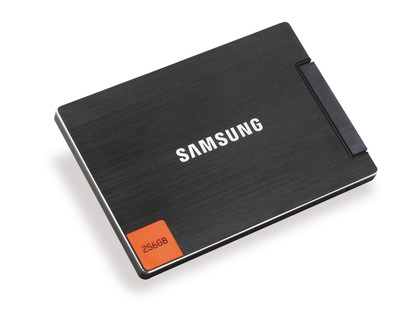Why you can trust TechRadar
Unlike the competition, the SSD 830's controller, DRAM and NAND are all designed and built by Samsung itself.
That's surely advantageous when writing the firmware – if each component is built to get along with the others from the initial design phase, firmware can really zero in on performance and reliability.
It's the latter that Samsung is emphasising with this drive.

Performance levels in the benchmarks we ran fell short of leading drives, but were especially impressive when dealing with incompressible data, which we'll cover later.
Without reliability though, these performance levels don't mean much.
SSD reliability is also the toughest aspect to get to grips with in a review. It's something that can be judged over months and years, not weeks.
Samsung's own test results show a 64 year lifespan for the SSD 830 with 10 GB written onto it each day, or 16 years with a rather improbable 40 GB daily write.
Sign up for breaking news, reviews, opinion, top tech deals, and more.
Those are really encouraging figures, and it's relieving to see reliability emphasized so heavily in a product type that hasn't always enjoyed the best *cough Sandforce 2200 series cough* track record.
The drive's firmware, which can be kept up to date by Samsung's Magician software, employs some nifty wear-levelling to avoid 'wearing out' blocks by writing to the same areas over and over. The firmware also runs a Sudden Power Off Recovery algorithm to prevent data loss if there's a power cut.
Sadly, we won't be able to see the fruits of these features until after a few months of heavy use, but current signs look encouraging and Samsung's pedigree in enterprise drives and extended OEM relationship with super-fussy Apple are good to keep in mind if you're looking for a dependable drive.
What we can talk about is performance.
549 MB/s read speeds for compressible data just about keep up with the quickest drives on the market, but the write speed of 407 MB/s falls back considerably.
However, the SSD 830 shines when dealing with incompressible (already compressed) data like media files.
It's the Achilles heel of the Sandforce controller, but certainly not Samsung's three core ARM9 controller which hits almost double the incompressible write speeds of competitors.
The Samsung SSD 830 isn't the quickest drive, but it deals well with incompressible data, boasts high IOPS and random read/write performance, and it's well priced.
If it's as reliable as it looks, the SSD 830 will be a fine long-term drive.
We liked:
With the emphasis on reliability in the Samsung SSD 830 that does give us confidence in the long-term use of this as a main drive.
The bespoke Samsung firmware also deals well with incompressible data, something traditional SandForce SSDs struggle with. The fact it can keep pace with the brilliant OCZ Vertex 3 Max IOPS in that respect is impressive.
We disliked:
Sadly, while it keeps pace it cannot best the performance of those competitors in compressible data.
Final word:
A really strong consumer-level effort from Samsung, though the SSD 830 isn't the quickest drive around.

Ad creative by day, wandering mystic of 90s gaming folklore by moonlight, freelance contributor Phil started writing about games during the late Byzantine Empire era. Since then he’s picked up bylines for The Guardian, Rolling Stone, IGN, USA Today, Eurogamer, PC Gamer, VG247, Edge, Gazetta Dello Sport, Computerbild, Rock Paper Shotgun, Official PlayStation Magazine, Official Xbox Magaine, CVG, Games Master, TrustedReviews, Green Man Gaming, and a few others but he doesn’t want to bore you with too many. Won a GMA once.